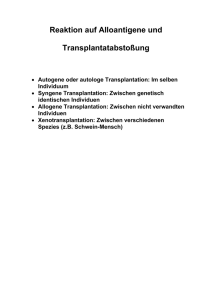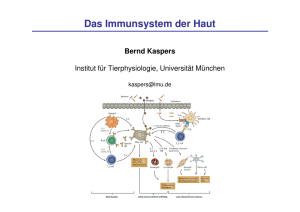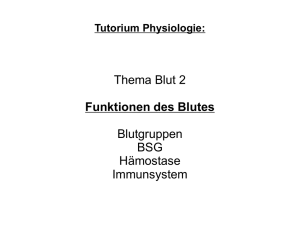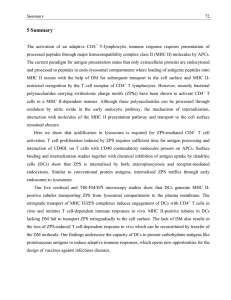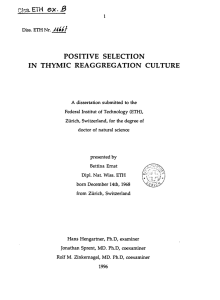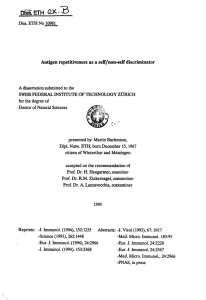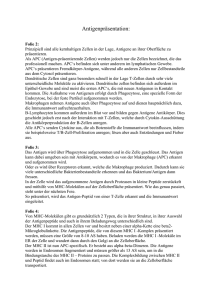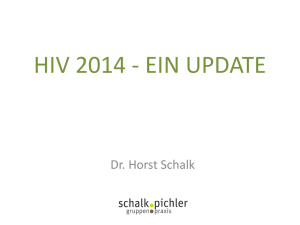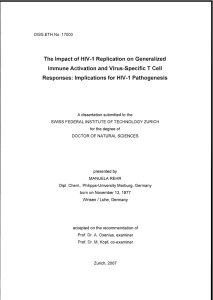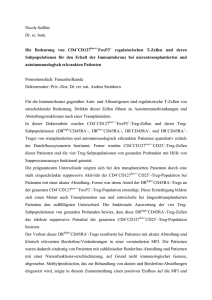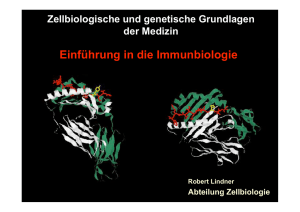Abstract
Werbung
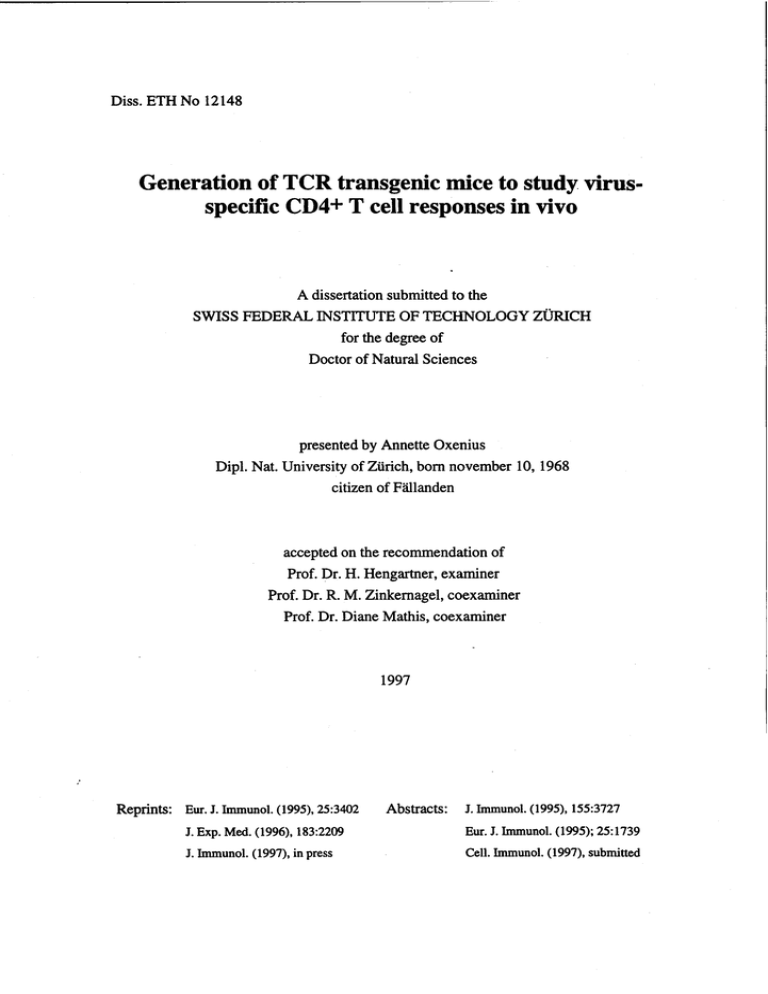
Diss. ETH No 12148 Generation of TCR transgenie mice to study virusspecific CD4+ T cell responses in vivo A dissertation submitted to the SWISS FEDERAL INSTITUTE OF TECHNOLOGY ZüRICH for the degree of Doctor of Natural Seiences presented by Annette Oxenius Dipl. Nat. University ofZürich, born november 10, 1968 citizen of Fällanden accepted on the recommendation of Prof. Dr. H. Hengartner, examiner Prof. Dr. R. M. Zinkernagel, coexaminer Prof. Dr. Diane Mathis, coexaminer 1997 Reprints: Eur. J. Immunol. (1995), 25:3402 Abstracts: J. Immunol. (1995), 155:3727 J. Exp. Med. (1996), 183:2209 Eur.1. Immunol. (1995); 25:1739 J. Immunol. (1997), in press Cello Immunol. (1997), submitted 5 Summary Antigen-specific immunity on the level of CD4+ T cells has been mostly addressed using chemically defined, soluble protein antigens. Thanks to valuable conceptual knowledge emerging from these studies, it is now possible and of great interest to study CD4+ T cell functions in biologically relevant infectious disease models especially since viruses may often behave differently as compared to soluble protein antigens in terms aof antigen presentation, dynamics of antigen load and in their ability to activate multiple immune effector functions. Thus, virus-specific CD4+ T cell responses induced by infection with non-cytopathic lymphocytic choriomeningitis virus (LCMV) were characterized focussing on several aspects: i) MHC class II-associated antigen presentation of LCMV-derived epitopes, ii) requirements for in vivo activation of LCMV-specific CD4+ T cells and iii) the generation and functional characterization of TCR transgenic mice with specificity for a LCMV-derived Th cell epitope. Chapter 1 of the results section describes the molecular analysis of LCMV-derived Tb cell epitopes and in vitro antigen presentation characteristics of these LCMV-derived MHC class II-binding epitopes upon infection of professional antigen presenting cells (APCs). Intracellularly synthesized, membrane-associated LCMV glycoprotein was found to be able to load MHC class 11 molecules independently of processing in acidic compartments and independently of the presence or absence of the invariant chain whereas intracellularly synthesized, cytosolic LCMV nucleoprotein was not able to load MHC class 11 molecules in LCMV infected APCs. This alternative MHC class 11 presentation pathway of endogenously synthesized LCMV glycoprotein was not only functional in vitro but also in vivo upon LCMV infection of invariant chaindeficient mice, as demonstrated in chapter 2 of the results section. Chapter 3 analyzes the in vivo requirements of CD40-CD40L interaction either for the induction of humoral, virus-specific immune responses or, on the other hand, for the functional activation of virus-specific CD4+ T cells. The fourth chapter of the results section describes the generation of TCR transgenic mice specific for an epitope of the LCMV glycoprotein. Phenotypical and functional characterization of these mice focussed on the antiviral protection potential of virusspecific CD4+ T cells as weIl as on the capacity of virus-specific Th cells to mediate help for antibody production against different virus-derived proteins. 6 Zusammenfassung Antigenspezifische Immunität auf der Ebene von CD4+ T Zellen wurde hauptsächlich mittels chemisch definierten, löslichen Proteinantigenen untersucht. Da diese Untersuchungen zu wertvollem Grundlagenwissen führten, ist es nun möglich und von grossem Interesse, CD4+ T Zellfunktionen in biologisch relevanten infektiösen Modellsystemen zu evaluieren, insbesondere weil sich Viren und lösliche Proteinantigene oft unterschiedlich verhalten was Antigenpräsentation, Antigendynamik und die multiplen, immunaktivierenden Eigenschaften von Viren anbelangt. In diesem Zusammenhang wurden virus-spezifische T Zellantworten, die nach Infektion mit nicht-zytopathischem Lymphozytärem Choriomeningitis Virus (LCMV) induziert wurden, charakterisiert, wobei mehrere Aspekte berücksichtigt wurden: Im Kaptitel 1 des Resultateteiles wird die molekulare Analyse von LCMV Helferzellepitopen beschrieben sowie in vitro Antigenpräsentationseigenschaften dieser MHC Klasse 11 bindenden Helferzellepitope nach LCMV Infektion von professionell antigenpräsentierenden Zellen (APZ). Intrazellulär synthetisiertes, Membran-assoziiertes LCMV Glykoprotein zeigte die Fähigkeit, MHC Klasse 11 Moleküle unabhängig von Prozessierung in sauren Kompartimenten und unabhängig von der An- oder Abwesenheit der invarianten Kette zu beladen. Intrazellulär synthestisiertes, zytosolisches LCMV Nukleoprotein hingegen vermochte nicht, MHC Klasse 11 Moleküle in LCMV-infizierten Zellen zu beladen. Dieser zusätzliche MHC Klasse 11 Präsentationsweg von intrazellulär synthetisiertem LCMV Glykoprotein war nicht nur funktionell in vitro, sondern auch in vivo nach LCMV Infektion von Mäusen, welche keine invariante Kette besitzen, was das Thema des Kapitels 2 des Resultateteiles darstellt. Kapitel 3 des Resultateteiles analysiert die Notwendigkeit der CD40-CD40Ligand Interaktion einerseits für die Induktion von humoralen, virus-spezifischen Immunantworten und andererseits für die funktionelle Aktivierung von virusspezifischen, CD4+ T zellen. Das vierte Kapitel des Resultateteiles beschreibt die Herstellung von T Zellrezeptor transgenen Mäusen mit Spezifität für ein LCMV Glykoprotein Helferzellepitop. Die phänotypische und funktionelle Charaktersierung dieser Mäuse konzentriert sich vor allem auf das antivirale Protektionspotential von virus-spezifischen CD4+ T Zellen sowie auf die Fähigkeit von virus-spezifisichen Th Zellen, Hilfe für die Antikörperproduktion gegen verschiedene Virusproteine zu vermitteln.
